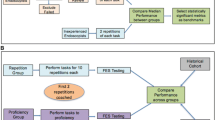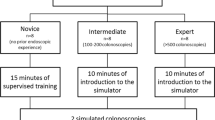Abstract
Background
Virtual reality simulation in gastrointestinal endoscopy is an educational tool that allows repetitive instruction in a non-patient care environment.
Aim
To determine the impact of a virtual endoscopy training curriculum applying an objective pre- and post-training analysis on trainee endoscopists.
Methods
A before–after training study was carried out. Subjects were first year fellows of gastroenterology, who completed a questionnaire and then performed two pre-training simulated cases. The virtual endoscopy training curriculum consisted of an 8-h workday utilizing two GI MENTOR™ in a specialized clinical simulation center. After the training, all subjects completed the same two cases they did in the pre-training. Pre- and post-training results’ comparisons were made by paired t test.
Results
Totally, 126 subjects were included (mean age 30 years, 61% female). A significant improvement from pre- to post-training was observed in psychomotor skills (total time, percentage, and number of balloons exploded) and endoscopic skills (cecal intubation time, percentage of examined mucosa, and efficacy of screening). There was also an improvement in the quality of the endoscopic study; percentage of examined mucosa over 85% showed a significant improvement post-training with an adjusted OR of 2.72 (95% CI 1.51–4.89, p = 0.001).
Conclusions
Virtual endoscopy training curriculum produces a significant improvement in the trainee endoscopists performance and their psychomotor skills and introduces the concept of a quality endoscopic study in a non-patient, risk-free environment.



Similar content being viewed by others
Abbreviations
- GI:
-
Gastrointestinal
- VS:
-
Virtual simulator
- VE:
-
Virtual endoscopy
- NE:
-
Novice endoscopists
- VR:
-
Virtual reality
References
Faulx AL, Lightdale JR, Acosta RD, et al. Guidelines for privileging, credentialing, and proctoring to perform GI endoscopy. Gastrointest Endosc. 2017;85:273–281.
Ziv A, Ben-David S, Ziv M. Simulation based medical education: an opportunity to learn from errors. Med Teachnol. 2005;27:193–199.
Singh S, Sedlack RE, Cook DA. Effects of simulation-based training in gastrointestinal endoscopy: a systematic review and meta-analysis. Clin Gastroenterol Hepatol. 2014;12:1611–1623.
Kruglikova I, Grantcharov TP, Drewes AM, et al. The impact of constructive feedback on training in gastrointestinal endoscopy using high-fidelity virtual-reality simulation: a randomized controlled trial. Gut. 2010;59:181–185.
Walsh CM, Ling SC, Wang CS, et al. Concurrent versus terminal feedback: it may be better to wait. Acad Med. 2009;84:S54–S57.
Walsh CM, Ling SC, Khanna N, et al. Gastrointestinal endoscopy competency assessment tool: development of a procedure-specific assessment tool for colonoscopy. Gastrointest Endosc. 2014;79:798–807.
Bini EJ, Firoozi B, Choung RJ, Ali EM, Osman M, Weinshel EH. Systematic evaluation of complications related to endoscopy in a training setting: a prospective 30-day outcomes study. Gastrointest Endosc. 2003;57:8–16.
McCashland T, Brand R, Lyden E, de Garmo P. The time and financial impact of training fellows in endoscopy. CORI research project. Clinical outcomes research initiative. Am J Gastroenterol. 2000;95:3129–3132.
Desilets DJ, Banerjee S, Barth BA, et al. Endoscopic simulators. Gastrointest Endosc. 2011;73:861–867. https://doi.org/10.1016/j.gie.2011.01.063.
Ekkelenkamp VE, Koch AD, de Man RA, Kuipers J. Training and competence assessment in GI endoscopy: a systematic review. Gut. 2016;65:607–615.
Van Sickle KR, Buck L, Willis R, et al. A multicenter, simulation-based skills training collaborative using shared GI Mentor II systems: results from the Texas Association of Surgical Skills Laboratories (TASSL) flexible endoscopy curriculum. Surg Endosc. 2011;25:2980–2986. https://doi.org/10.1007/s00464-011-1656-7.
Buzink SN, Koch AD, Heemskerk J, et al. Acquiring basic endoscopy skills by training on the GI Mentor II. Surg Endosc. 2007;21:1996–2003. https://doi.org/10.1007/s00464-007-9297-6.
Cohen J, Cohen SA, Vora KC, et al. Multicenter, randomized, controlled trial of virtual-reality simulator training in acquisition of competency in colonoscopy. Gastrointest Endosc. 2006;64:361–368.
Eversbusch A, Grantcharov TP. Learning curves and impact of psycho-motor training on performance in simulated colonoscopy: a randomized trial using a virtual reality endoscopy trainer. Surg Endosc. 2004;18:1514–1518.
Funding
This research did not receive any specific grant from funding agencies in the public, commercial, or not-for-profit sectors.
Author information
Authors and Affiliations
Corresponding author
Ethics declarations
Conflict of interest
The authors declare that they have no conflict of interest.
Additional information
Publisher's Note
Springer Nature remains neutral with regard to jurisdictional claims in published maps and institutional affiliations.
Rights and permissions
About this article
Cite this article
Piskorz, M.M., Wonaga, A., Bortot, L. et al. Impact of a Virtual Endoscopy Training Curriculum in Novice Endoscopists: First Experience in Argentina. Dig Dis Sci 65, 3072–3078 (2020). https://doi.org/10.1007/s10620-020-06532-8
Received:
Accepted:
Published:
Issue Date:
DOI: https://doi.org/10.1007/s10620-020-06532-8




